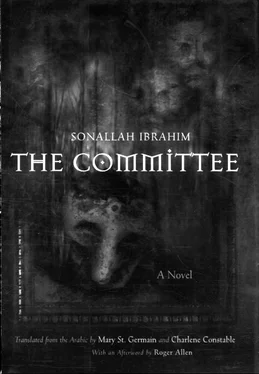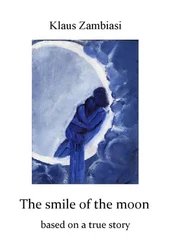It wasn't possible to consult the Committee. Even if it were possible, it would only make me look inept and ruin my chances, since the Committee puts so much emphasis on the way its questions are interpreted. Better to rely on myself.
I consulted a dictionary and found that in the Committee's language, "luminary" has one meaning: having the characteristic of reflecting light. But in Arabic, it has multiple meanings. It is used to mean lighting and lightning; to mean theft, as in "light fingered." Likewise they say of a pregnant woman: "She glows," and also for someone with exceptional intelligence: "He's brilliant." But the most "luminous" can be the one most given to lying. Apparently the current popular expression "the original shine" is derived form this latter meaning. This phrase first became famous as the brand name of a new shoe polish and then over time evolved into an epithet for anyone addicted to deception, exaggeration, and pretense.
You can imagine my confusion, for the Committee could intend any of these meanings. Which should I look for among the hundreds of personalities who make an incessant racket either in a particular Arab country or throughout the whole Arab world?
I mulled this over for a while, without getting anywhere. Finally, I decided to consider some well-known local names in various fields, without setting standards for a decision. By eliminating one after another I would pare down the search to a limited number of names and criteria. Then I could make up my mind as to the final standards of selection.
I began with political leaders and rulers. No one makes as much noise as they do. But I soon saw the problems that would result from selecting any of them. As is well known, they are subject to controversy. In a study like mine, I must assess the personality and I might take a point of view contrary to the Committee's. I could avoid this by choosing another topic.
I decided to eliminate leaders and rulers. When I could not bring to mind the name of one military leader, I rejected them too. Then I cut out the poets, because, perhaps mistakenly, I didn't like their high-flown language and obfuscation. Thus, I was prejudiced against them from the start and lacked the complete objectivity such a study required.
I jotted down the names of a number of prominent writers. But when I began to analyze each one's standing, I found it arose out of the ideas and principles they had espoused at some time. After much analysis, I perceived that these writers fell into two groups: one, whether out of intimidation or fear, maintained silence, even though knowing full well what was going on; the other backed off conveniently and smoothly from its previous causes to the point of disowning them.
I searched in vain for one judge whose name was linked with an honorable stance. On this basis, I also threw out journalists, union leaders, and "representatives of the people."
I discovered that most scientists, doctors, artists, engineers, teachers, and university professors were so busy amassing fortunes that they didn't contribute a thing to their professions. It's true that some emigrants are world famous for their discoveries or inventions. (Although I suspect that in most cases, this is nothing more than a trumped-up claim.) But this happened abroad, after they had grown up and been educated in our midst. Their inventions and discoveries were placed at the service of the foreign country and its people. How then are they tied to their birthplace?
Next I contemplated several singers who enjoy a wide popularity. All Arabs listen to them passionately, whether on a mountaintop, in the trackless desert, or in the heart of a city. But I find the hackneyed words and sentimental tunes they din out distasteful.
I did have a soft spot for the voice of one of the greatest, who had a special genius for staying at the top of the charts. In fact, for more than half a century, he remained there, untouched by the stormy events that shook this country. But by chance, I knew the source of most of the melodies for which he took credit, just as I knew that he paid a number of public relations men something like a monthly salary to keep his name in lights, and that he would mercilessly fight the least sign of a new competitive voice.
I spent a comparable amount of time studying the status of those puppets who fill the barren movie and television screens, but I couldn't get enthused about studying any of them in detail. In spite of the precariousness of my position, and my extreme need to gain the Committee's approval, I resolved that in all my affairs, I would only undertake projects that strike a chord in me or that draw a response from something profound or pure within me.
Only the dancers pictured daily in the newspapers remained. Thousands of individuals thirsty for knowledge come from all corners of the Arab world for the pleasure of seeing them in the nightclubs scattered at the foot of the pyramids.
There is something attractive about studying them. By that I mean their remoteness from ideological and political affairs, which in and of itself ensures that I would not aggravate the Committee.
One of them who was constantly in the news flashed across my mind. I had seen her in person only once, by chance, at a nightclub where she was dancing. Even though her movements were not sensuous, I was fascinated by the fleeting glimpses of her lithe, statuesque body, revealed under her shiny, flowing costume. Gifts were showered upon her, and I noticed she had trouble depositing them between her ample breasts. Her costume obviously didn't have room for many of the tenpound notes the gifts consisted of. The state finally recognized this problem when it issued new onehundred-pound notes in small, appropriate sizes, thus demonstrating this woman's influence.
I thought about this for a long time. Spending some time alone with her to gather facts for the study appealed to me. She might even allow me to explore the much-used places of her great "art."
Nevertheless, I had to give up this idea, although regretfully. I would meet fierce resistance from the Committee's female members, which would in turn undoubtedly win me some support, at least outwardly, from the other members.
At that point, I felt deeply frustrated and impotent. I saw I was heading for moral bankruptcy and failure. I blamed myself for being led along right from the beginning by a will-o'-the-wisp of ambition developing out of my exaggerated confidence in my abilities and setting me up for an encounter with the Committee as well as for further ordeals.
One morning I thought about this. I was nonchalantly looking over the headlines, stopping at some of them to read the details, with a feeling of bitterness welling up in me as usual.
A full-page ad on the last page caught my eye. It showed a scene from the opening ceremonies of a new American-Arab bank, attended by a number of its senior founders, the majority of whom are prominent personalities.
What caught my attention, to be exact, was the shiny suit of one man. I hadn't recognized him at first, because of the distortion typical in newspaper pictures. I only picked him out after reading the names of those pictured.
His full name sounded strange, because he was known to me and to most others solely by the title "the Doctor." Though our countries swarm with thousands bearing this very scholarly title, its mere mention is enough to indicate him and no other.
Both his name and title, as well as the shiny suit and some old memories, kept surfacing in my mind all day. I had seen him once in person, about five years ago, when my taxi stopped at a traffic light in Ramses Square. I saw everyone looking at a magnificent, latemodel Mercedes, with our friend seated in the back talking on a telephone. It was odd at the time, because we were still in the aftermath of the October War and weren't yet open to the West. Moreover, how do you suppose a mobile phone could possibly work when most phones in the country were out of order?
Читать дальше











